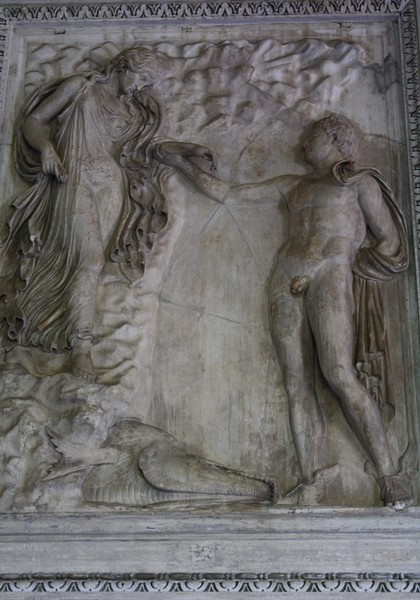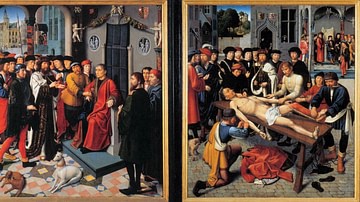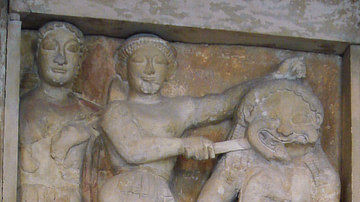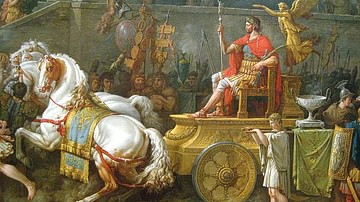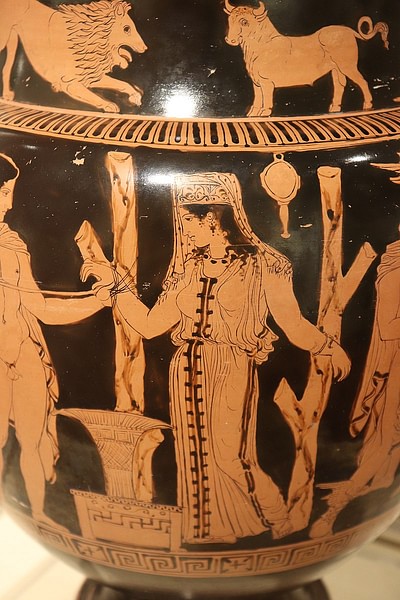
Andromeda is a princess in Greek mythology. She is the daughter of Cepheus, the king of Aethiopia (Ethiopia), and his wife, Cassiopeia. The most famous myth associated with Andromeda is the story of her rescue by the Greek hero Perseus, who saved her from being sacrificed to a sea monster. She married Perseus, and they had several children together.
Andromeda is also one of the best-known and recognised star constellations, which also contains the Andromeda Galaxy, the largest galaxy closest to the Milky Way.
Family
Andromeda is the daughter of Cassiopeia and Cepheus, the king of Aethiopia. However, some sources mention that Cepheus was the king of Joppa (in modern-day Israel). After Perseus rescued Andromeda, they got married, and together they had seven sons and two daughters, including Perses (the legendary founder of Persia, from whom all Persian kings are descended), Helios, Alcaios, Mestor, Electryon, Sthenelos, Cynurus, Autochthe, and Gorgophone.
The Rescue of Andromeda
Queen Cassiopeia, Andromeda's mother, foolishly stated that she and her daughter were more beautiful than all the Nereids (sea nymphs). The Nereids complained to Poseidon, who was their protector and friend. Angered by this bold claim, Poseidon sent a vicious sea monster named Cetus and a flood to ravage Aethiopia. The Oracle of Ammon prophesied that Aethiopia could only be saved if Andromeda was sacrificed to the sea creature. Andromeda was stripped naked, except for some jewels, and chained to a rock in the sea to await her fate.
The Greek hero Perseus, who was most famous for killing the Gorgon Medusa and for founding Mycenae, happened to be flying around the coast of Aethiopia (some sources state that it was Philistia) in his winged sandals when he saw Andromeda chained to a rock. He was struck by her beauty and instantly fell in love with her.
I ask you to tell me your name, sweet girl, and the name of your country.
Tell me why you are chained here'. At first she was silent, constrained by maidenly shyness in front of a man; if her hands had been free
of their bonds, she'd have lifted them up to her face to cover
her blushes.
Her eyes could speak, though, filled as they were with welling tears.
He continued to press her and therefore, not to appear to
be hiding
a fault of her own, she told him her name and the name of
her country
and how her mother had wickedly boasted about her
beauty.(Ovid, Metamorphoses, 4.678-686)
Suddenly there was a loud roar, and a fearsome monster emerged from the waves. Andromeda screamed in fright. Her parents, Cepheus and Cassiopeia, arrived and anxiously waited on the shore nearby, wailing in anguish. As they clung to their daughter's chained body, Perseus introduced himself to them and offered his help to save her life, but only if she could become his wife. After some discussion, Cepheus and Cassiopeia smartly agreed to his terms and promised him their kingdom as a dowry if he saved their daughter.
Perseus approached the sea monster, Cetus, from the air. The creature was startled by his shadow, and Perseus used this distraction to swoop down and stab the monster in the back. Perseus was able to avoid the monster's jaws by flying out of its reach, and he continued to hack at its body. Other versions of the myth state that Perseus used Medusa's head to kill Cetus. Once Perseus had finally defeated the creature, applause echoed from Mount Olympus and the shore, where people had gathered to watch the battle. Cepheus and Cassiopeia were overjoyed and proclaimed Perseus their daughter's saviour.
Perseus & Andromeda
Perseus built three altars for Zeus, Hermes, and Athena and made sacrifices to them to thank them for Andromeda's safety. He turned down the dowry offered to him by Andromeda's parents, happy enough to have Andromeda's hand in marriage as his reward. The palace was richly decorated for Perseus and Andromeda's wedding feast, with garlands hanging from the ceiling and torches filled with incense. Once the feast was over, Perseus entertained the wedding guests with stories of his heroic deeds.
The wedding banquet was interrupted by the arrival of Phineus, Cepheus' brother, who claimed that Perseus stole Andromeda from him. Cepheus defended Perseus.
Why didn't you fetch her away from the rocks to which she was pinioned?
The prize has gone to a hero who saved an old father from losing his daughter.
Allow him to take what I promised and what he's deserved.(Ovid, Metamorphoses, 5.26-29)
Cepheus' words only enraged Phineus more, and he flung a spear towards his brother and Perseus. Weapons quickly began to fly as Phineus and his men faced Perseus. Athena arrived to offer protection and support to Perseus while Andromeda stood at his side. Perseus finally ended the fight by brandishing Medusa's head. Phineus saw all the death he had caused and begged for mercy. However, his pleas fell on deaf ears, and Perseus turned him to stone.
According to other traditions, Cassiopeia warned Phineus of Perseus and Andromeda's upcoming wedding, with both her and her husband taking his side in the fight for Andromeda, despite him doing nothing to rescue Andromeda from the sea monster. Perseus turned both Cepheus and Cassiopeia into stone with Medusa's head.
After his victory, Perseus took Andromeda to his hometown of Seriphos, and they then travelled to Argos, where he inadvertently won the throne after accidentally killing his grandfather Acrisius. Perseus swapped kingdoms with Megapenthes and ruled Tiryns instead of Argos.
Perseus and Andromeda lived in Mycenae for many years. They had seven sons and two daughters together, the most famous of them being Perses, the legendary founder of Persia.
An Alternative Version of the Myth
The Greek mythographer Conon (c. 63 BCE to 14 CE) wrote a different version of the Perseus and Andromeda myth in his collection of 50 stories about the heroic and mythical history of ancient Greece. According to Conon's account, both Phineus and Phoenix were vying for Andromeda's hand. After much consideration, Cepheus decided that she would marry Phoenix. However, he did not want his brother to know that he had chosen another man over him and devised a plan. He got Phoenix to abduct Andromeda from an island she frequently visited to make offerings to Aphrodite.
Phoenix grabbed her and stowed her away on his ship called the Cetus. Andromeda was not aware of her father's plan and screamed for help. Perseus happened to be sailing past, and hearing Andromeda's screams, he stopped his boat. Falling in love with Andromeda at first sight, he viciously attacked those on board the ship and destroyed the Cetus to rescue her. It is said that those on board the ship were frozen in fear, which translated to people being turned to stone by Medusa's head. Andromeda married Perseus and sailed off with him to Greece.
Andromeda Constellation
After Andromeda had died, the gods set her among the stars, along with Perseus, Cassiopeia and Cepheus, where they still remain to this day. There are nine named stars in the Andromeda constellation, and they can be found within the Andromeda Galaxy (Messier 31). It is the closest major galaxy to the Milky Way and is large enough to be seen with the naked eye, with the best visibility occurring during November in the Northern Hemisphere.
If you study the constellation closely, you can make out a sprawled figure with outstretched arms and its feet pointing in the direction of the Perseus constellation while the head points to the Pegasus constellation. The brightest star in the constellation is Alpheratz, which forms Andromeda's head, while Mirach forms the left hip and Almach makes up the foot.
The story behind the discovery of the Andromeda Galaxy is not known. However, the existence of the constellation has been known since ancient times, with mention of it being found in astronomer and mathematician Claudius Ptolemy's (c. 100 to c. 170 CE) work the Almagest and in the Book of the Constellations of Fixed Stars by the Persian astronomer Abd al-Rahman al-Sufi (903-986 CE), which was written in 964 CE. Abd al-Rahman al-Sufi described the Andromeda Constellation as a "little cloud."
Legacy
The story of Andromeda's rescue has inspired many of the heroic stories we see today, where the prince rescues the princess, and they fall in love and live happily ever after. We can see this common theme in many Disney movies, including Snow White and the Seven Dwarfs (1937) and Sleeping Beauty (1959), as well as the adventure film The Princess Bride (1987). The story of Andromeda was featured in the movie Clash of the Titans (1981 and 2010).
Andromeda also inspired great artists like the Renaissance artist Titian (c. 1487-1576 CE), the Flemish artist Peter Paul Rubens (1577-1640), and the French painter Jean-Auguste-Dominique Ingres (1780-1867). Italian architect and painter Giorgio Vasari (1511-1574) depicted Andromeda's rescue in his Perseus and Andromeda (1570), which decorated the walls of the Palazzo Vecchio in Florence, Italy. The painting is based on Ovid's account of the myth and shows Perseus freeing a naked Andromeda from her chains. Perseus is wearing his winged sandals, and the shield that protected him from Medusa's deadly stare is lying at his feet.


